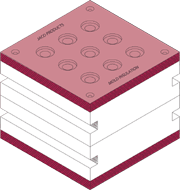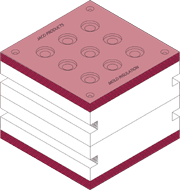Marinite® P and Transite® HT Parts
Calcium Silicate: Marinite® P and Transite® HT are perfect for Platen or Mold Thermal Insulation. They help lower energy use and enhance processing conditions in rubber and thermoset molding applications.
Marinite® P – 1800°F/982ºC Plastic Parts
A non asbestos material formed from calcium silicate with inert fillers and reinforcing agents. Recommended for thermal barrier insulation applications up to 1800°F/982ºC.
Marinite® P Stock Sizes
| Thickness | Standard Tolerance | Standard Sheet |
| .500″ – 2″ | ± .005″ | 48″ x 96″ |
| **Contact customer service 440-632-5800 for additional Marinite sizes/specifications. |
Transite® HT – 600°F/315ºC
A monolithic portland cement composite recommended for a maximum operating temperature of 450°F or 600°F/315ºC with proper heat conditioning.
Transite® HT Stock Sizes
| Thickness | Standard Tolerance | Standard Sheet |
| .250″ – 1.250″ | ± .031″ | 48″ x 96″ |
| 1.500″ – 3″ | ± .063″ | 48″ x 96″ |
| **Contact customer service 440-632-5800 for additional Marinite sizes/specifications. |


The Benefits of Using Transite | Non Asbestos Thermal Insulation Material
Transite is a popular non asbestos thermal insulation material used in a variety of applications for its thermal stability and strength. Both transite and marinite reduce energy consumption and are known to improve processing variables for rubber and thermoset molding.

Traditionally, transite was made with anywhere from 12%-50% of asbestos fiber that was added to increase tensile strength. It was used in home and industrial applications, from furnaces to siding, where the use of fire resistance was especially important. However, as industries and experts came to realize that asbestos was harmful and contained toxins, it was phased out. Now, transite is made as a non asbestos thermal insulation material that is safe and reliable for many applications.
Today, transite HT is made as a monolithic portland cement board, recommended for a maximum operating temperature of 450℉ or 600℉ with the right heat conditioning.
Transite has properties that make it great in electrical and thermal applications, including:
- Strength: The strength of this non asbestos thermal insulation material makes it ideal for press plates, machine guards, and load bearing gaskets.
- Thermal insulation: Transite is used often in industrial and baking oven shelving, splash guards, and welding shields. It is a popular, harmless insulator that performs well under extreme temperatures.
- Electrical applications: Transite can be used in a number of electrical applications including as electrical coil supports, bushings, mounting plates, and more.
How is Transite HT Formed? | Properties and Benefits
Transite HT is a high density, non asbestos thermal insulation material that provides a level of strength, thermal stability, and machinability other materials do not. Transite HT is hydraulically pressed into monolithic boards that are free of asbestos, and utilize Portland cement and non-ceramic fibers to finish the board. Then, the board is air-cured.
As mentioned, Transite HT can be used in environments of up to 600℉ with proper heat controlling techniques in place. When compared to other materials, this non asbestos thermal insulation material will shrink less when placed under this extreme heat.
Transite HT is popular in the foundry industry, where materials are derived from foundry workshops. This is essentially a workshop where metal casting is produced, which requires the use of molten metal to be poured into a mold. This means that extremely high temperatures are being used, which is why a material like Transite HT is perfect for this application. Transite foundry applications include induction furnace casting, flask liners, and more.
Manufacturers rely on Transite HT because it is non-conductive and has low thermal conductivity. Thermal conductivity refers to the degree at which a material conducts electricity, which is calculated by the ratio of the current material density to the electric field that causes the current flow. The Transite HT board also creates equal strength in all directions which provides the dimensional stability needed to perform certain operations. As mentioned, the Transite board will not delaminate (become divided into layers), because it is monolithic.
Over time, this non asbestos thermal insulation material will not rot, wear, or chip thanks to its high impact resistance and strength. If it is placed near water or exposed to damp conditions, it will not begin to mold. These benefits are part of what makes Transite popular and widely used across industries.
Choose Jaco for Transite and Marinite Stock
Jaco Products has decades of experience in manufacturing platen and thermal insulation. When it comes to handling non asbestos thermal insulation material, we are the experts in creating durable insulation products that withstand the most extreme applications. Both Transite and marinite are ideal for platen or mold thermal insulation, and are an energy-efficient way to get the job done.

What else can Jaco Products do for you? Here are some additional services that we offer:
Plastic Machining: Plastic machining is a subtractive method of forming and shaping a product by removing layers of material. The three most common types of processes within plastic machining include: turning, drilling, and milling. Jaco has an outstanding level of precision and commitment to every one of these plastic machining processes.
Plastic Stamping: Plastic stamping uses a punch press to cut shapes out of a strip of extruded plastic sheets, or other non-metallic substances, utilizing various dies. Plastic stamping allots for varying pressures to be applied throughout the process, which allows the manufacturer to create very thin products. From washers to gaskets, we are the experts in all things plastic stamping.
Injection Molding: Jaco offers custom injection molding of thermoplastic materials up to 29 oz. Our reputation as experts in precision injection molding make us a leader in this complex process. We are one of the top injection molding companies in Ohio.
Whether you need sheets of non asbestos thermal insulation material, plastic injection molding, or any other specialized plastic product service, look to Jaco Products. Our expertise and decades of experience means we are fit to take on any challenging project.


